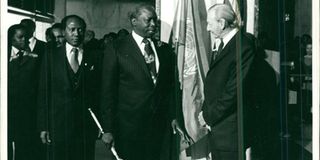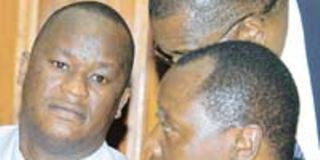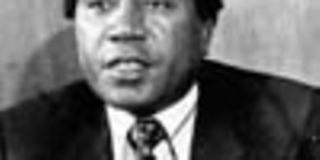Premium
Moi ordered Ouko killed, inquiry told

UN Secretary-General Kurt Waldheim (right) welcomes President Daniel Moi (centre) and Foreign Minister Robert Ouko (left) to the Secretariat Building in New York on September 24, 1981.

Mutito MP Kiema Kilonzo (left) and Raphael Wanjala (seated right) consult during yesterday's session.
Photo by Joseph Mathenge
It was President Moi who ordered the killing of his Foreign minister 15 years ago, the Parliamentary Select Committee investigating the death was told yesterday.
Committee chairman Gor Sunguh said Scotland Yard detective John Troon told the committee in London two weeks ago that Dr Robert Ouko was killed because of "an executive order".
Mr Sunguh said: "This executive order was issued by none other than President Moi."
The Sunguh committee was in Britain two weeks ago to receive evidence from Mr Troon, who extensively investigated the murder, and Swiss business consultant Marianne Briner.
Mr Sunguh said the President fired Dr Ouko, who was the MP for Kisumu Town, and sent him to his Koru home as his security was withdrawn.
"No other person had such an executive authority" to order the killing of Dr Ouko, Mr Sunguh said.
Dr Ouko went missing from his Koru home on February 12, 1990, and his remains were found at the foot of Got Alila four days later.
The Sunguh committee yesterday rejected lawyer Mutula Kilonzo's bid to give evidence on behalf of Mr Moi, who had been summoned to testify in the morning.
Mr Sunguh said the retired President should appear in person and give his version of the story because efforts by Mr Troon to interview him had proved futile.
The committee gave a list of questions they wanted Mr Moi to answer.
"The President himself said at a public rally that people who poisoned Vice-President George Saitoti '...are the same ones who killed Dr Ouko...' We would have liked him to tell us who these people are and how he came to know them," Mr Sunguh said.
Mr Sunguh said Mr Troon had tried to interview Keiyo South MP Nicholas Biwott as the prime suspect but that Mr Biwott had been "shielded" by Mr Moi.
A letter from the British High Commission tabled before the committee showed Mr Troon had in 1990 concluded his probe and had said there was enough evidence to arrest Mr Biwott and other senior officials but that Mr Moi had denied him permission to do so.
Mr Sunguh said President Moi had pledged no stones would be left unturned in the investigation but that, instead, "all stones and boulders were put in the way of investigations".
Mr Sunguh said the Moi administration started parallel investigations to Mr Troon's using the dreaded Special Branch. Then Mr Jonah Anguka, a district commissioner at the time Dr Ouko died, had been "planted" in the matter and charged with the murder.
Mr Troon's life was threatened and he had to leave the country in 72 hours, he said.
President Moi's government was guilty of a cover-up in Dr Ouko's murder, Mr Sunguh said.
"It also participated in elimination of witnesses to the murder," Mr Sunguh added.
The chairman said the committee had counted more than 100 possible witnesses who had died in mysterious circumstances.
"These are some of the issues that should have been answered by Moi. We would have treated him with utmost respect . . . we are not going to bother him," Mr Sunguh said.

Dr Robert Ouko
He added: "It is unfortunate that we are now going to complete our report without his input."
Although failure to honour a parliamentary summons was "illegal", the committee would not take any action against the former president.
"Having been an MP for more than 40 years, as vice-president for 13 years and as president for 24, the man should have been a supporter of the rule of law," Mr Sunguh commented.
Mr Moi should not blame the committee if it rules that he was responsible for "certain things" in Dr Ouko's death.
Committee member Kiema Kilonzo said the committee wanted Mr Moi to explain what transpired during the Washington DC visit to which he was accompanied by both Dr Ouko and Mr Biwott. Dr Ouko was murdered several weeks later.
Mr Kilonzo said the committee wanted to hear from Mr Moi whether he had sent Dr Ouko on leave and confined him to his Koru home after Washington.
Mr Moi could also have explained a photograph tabled before the committee by Mr Biwott showing him saluting by the left hand.
Committee member Raphael Wanjala said: "The retired president's appearance here could have been very important for us because the work of all commissions when he was head of state was frustrated."
The MP for Budalang'i cited the premature disbandment of the Judicial Commission of Inquiry in 1991 and of Mr Troon's investigation.
The Sunguh committee wanted Mr Moi to explain whether he and Dr Ouko travelled on the same flight from Washington.
- About the road accident Dr Ouko was involved in on his way to Kericho on February 9, 1990.
- Whether the president communicated with Dr Ouko while he was on leave and
- Whether he received documents by the BAK group's directors complaining about mistreatment by some Cabinet ministers.
Mr Sunguh said his committee, which is expected to wind up next week, will unearth the people who killed Dr Ouko. Its report will be submitted to the Speaker of the National Assembly.
The committee rejected lawyer Kilonzo's bid to present an affidavit on behalf of Mr Moi, with Mr Sunguh saying that "witnesses must give evidence in person and not through their lawyers."
Mr Kilonzo argued that the committee rules allowed witnesses to be represented by advocates of their choice.
He said Mr Moi could not attend the proceedings because he had not been allowed to cross-examine witnesses who mentioned him adversely.
Mr Kilonzo said: "To appear before this committee will be to respond to evidence not subjected to standard procedure . . . He would be condoning a procedure he feels is unworthy of this House."
But Mr Sunguh said the committee was empowered to make its own rules and that the procedure was in line with the National Assembly's Powers and Privileges Act.
Evidence to the committee, Mr Sunguh said, could only be ascertained by oral examination of witnesses.
Assisting counsel Oriri Onyango accused Mr Kilonzo, who is also a Kanu nominated MP, of moving the goalposts. The lawyer, he said, had accepted the committee rule not allowing cross-examination of witnesses by lawyers when Ms Briner gave evidence in Nairobi.
Failure by Mr Moi to appear denied them an opportunity to test the veracity of his affidavit.
The committee also accused Mr Kilonzo of abusing them by saying their refusal to take the affidavit was a "terrible shame".
Mr Troon had also named permanent secretary Hezekiah Oyugi as a prime suspect in Dr Ouko's murder. Mr Oyugi died of illness in 1991.




